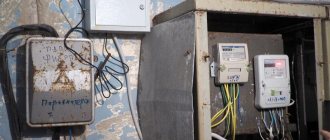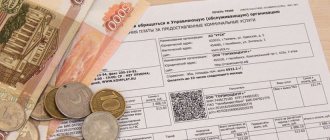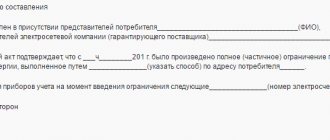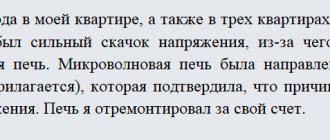Since 2021, the provisions of the Rules for the provision of utility services as amended by Decree of the Government of the Russian Federation dated December 26, 2017 No. 1498 regarding the recalculation of fees for utility services due to the temporary absence of a consumer in a residential premises have changed. Now recalculation is carried out only in the case when the absence of an IPU in the premises is due to the lack of technical ability to install a meter. Let's look at the new provisions in more detail, and also study the situation that arose in practice for our reader: the consumer demands a recalculation of fees for the period before the amendments come into force.
Is it possible not to pay utility bills if you are temporarily absent from your home?
If the owner or tenant is temporarily absent from the residential premises, this does not exempt him from paying utility bills, as follows from clause 11 of Art. 155 Housing Code of the Russian Federation. If individual metering devices are installed in the premises, then the person will pay according to their readings. However, for certain types of services under certain circumstances when the person was absent, the utility bill must be recalculated; more on this below.
To reduce utility bills, a person must be absent from the residential premises for more than 5 days in a row.
Thus, it is impossible not to pay utility bills at all when a person is absent from his place of residence. The size of a communal apartment can be reduced in cases established by law and in accordance with the established procedure. If a person simply does not pay for utilities, this will entail the accrual of penalties, an increase in the amount of debt, and then there may be legal proceedings.
To avoid negative consequences and reduce utilities during a temporary absence from a residential area, you must act according to the established rules.
New provisions encourage the installation of IPU
Along with numerous amendments to the Rules for the provision of public utility services, which enable the contractor to punish unscrupulous consumers with rubles, the principle of recalculating fees in the event of a consumer’s temporary absence from the premises was fundamentally changed. By the way, the recalculation procedure remained virtually unchanged.
So, if previously the recalculation was carried out for all consumers temporarily absent in the premises not equipped with an IPU, now the recalculation is carried out for consumers who were absent in the premises not equipped with an IPU due to the lack of technical ability to install it, confirmed in the prescribed manner (clause 86 Rules for the provision of public services). That is why the consumer’s application for recalculation should be accompanied not only by documents confirming the duration of the period of temporary absence, but also by an inspection report to determine the lack of technical feasibility of installing an IPU (clause 92 of the above rules).
In the absence of an IPU and the lack of confirmation of the lack of technical ability to install it, as well as in the event of a malfunction of the IPU in a residential premises (if the consumer fails to eliminate such a malfunction within 30 days), recalculation is not made. An exception is the case of the absence of all persons living in the residential premises as a result of force majeure, confirmed by relevant documents (for example, the eviction of citizens from their home due to an emergency).
The above provisions of the rules actually encourage owners of premises in apartment buildings to install IPU, if the appropriate technical capability is available. Otherwise, when calculating the fee, an increasing factor will be applied, and you can count on a reduction in the amount of payment only if the number of consumers changes (deregistration at the place of residence or temporary stay).
The procedure for recalculating utilities due to non-residence
If a person does not live in an apartment, then recalculation of utilities is possible if there are no metering devices. The exception is payment for heating, electricity and gas supply for heating purposes, as well as utilities for general household needs, which follows from paragraphs. 86, 88 of the Rules, which are approved by Decree of the Government of the Russian Federation No. 354 (hereinafter referred to as the Rules).
Section 8 of these Rules is devoted to the recalculation procedure. The recalculation does not involve complete exemption from utilities, but a reduction in the amount of payment for individual services.
The recalculation is done in proportion to the number of full days when the person was absent from the apartment. In this case, the calculation does not take into account the day of departure and the day of arrival of the person.
The manager makes the recalculation within 5 working days after receiving the resident’s application and documents confirming the temporary absence.
1. Recalculation of fees for housing and communal services.
Recalculation is a change in the previously accrued amount of payment for residential premises and utilities due to a change in conditions. Current legislation provides for the recalculation of fees for housing and communal services in the manner prescribed by the Housing Code of the Russian Federation, Decree of the Government of the Russian Federation dated May 6, 2011 No. 354 “On the procedure for providing utility services to citizens”, Decree of the Government of the Russian Federation dated 08/13/2006. No. 491 “On approval of the rules for the maintenance of common property in an apartment building and the rules for changing the amount of payment for the maintenance and repair of residential premises in the case of the provision of services and performance of work on the management, maintenance and repair of common property in an apartment building of inadequate quality and (or) intermittently, exceeding the established duration."
2. Recalculation of fees for housing services.
The rules for changing the amount of payment for the maintenance and repair of residential premises (including the maintenance of elevator facilities and removal of mercury-containing waste) in the case of provision of services and performance of work of inadequate quality and (or) with interruptions exceeding the established duration are approved by the Decree of the Government of the Russian Federation dated 13.08. 2006 No. 491. In cases of provision of services and performance of work of inadequate quality and (or) with interruptions exceeding the established duration, the management bodies of the homeowners’ association, housing, housing construction cooperative or other specialized consumer cooperative, the management organization, and in the case of direct management of an apartment building persons providing services (hereinafter referred to as responsible persons) are obliged to reduce the amount of payment for the maintenance and repair of residential premises to the owners of the premises. Owners of premises have the right to apply to change the amount of payment to the responsible person (MC, HOA, housing cooperative), and tenants of residential premises occupied under a social tenancy agreement or a rental agreement for residential premises of a state or municipal housing stock (hereinafter referred to as the tenant) - to the landlord . When an apartment building is managed by a management organization, tenants have the right to apply to change the amount of the fee to the relevant management organization. An application to change the amount of the fee can be sent in writing or made orally within 6 months after the relevant violation and is subject to mandatory registration by the person to whom it is sent. A person to whom a statement is sent in writing or made orally is obliged, within 2 working days from the date of its receipt, to send, respectively, to the owner of the premises or the tenant a notice of the date of its receipt, registration number and subsequent satisfaction or refusal to satisfy it, indicating the reasons for the refusal. When applying in person, a copy of the application from the owner of the premises or tenant of the residential premises is marked with the date of its receipt and registration number. The fact of detection of inadequate quality of services and work and (or) exceeding the established duration of interruptions in the provision of services or performance of work is reflected in an act of violation of quality or exceeding the established duration of the interruption in the provision of services or performance of work. This act is the basis for reducing the amount of payment for the maintenance and repair of residential premises.
3. Recalculation of utility bills.
Citizens have the right to recalculation if they are provided with utility services of inadequate quality or with interruptions exceeding the established duration. The Rules for the provision of utility services to citizens, approved by Decree of the Government of the Russian Federation of May 6, 2011 No. 354, contains Appendix No. 1, which clearly states under what conditions fees for utility services are subject to reduction. In accordance with paragraph No. 5 of Appendix No. 1 to the Rules for the provision of public services to citizens, the provision of hot water temperature at the point of distribution must be: at least 60 degrees. C - for open district heating systems; not less than 50 degrees. C - for closed district heating systems; no more than 75 degrees. C - for any heat supply systems. The permissible deviation in the temperature of hot water at the point of analysis at night (from 23:00 to 6:00 hours) should be no more than 5 degrees. C; in the daytime (from 6:00 to 23:00) by no more than 3 degrees. C. For every 3 degrees. When the temperature drops above permissible deviations, the fee is reduced by 0.1 percent for each hour of excess (in total for the billing period) of the permissible duration of the violation; when the hot water temperature drops below 40 degrees. Payment for consumed water is made according to the tariff for cold water. During interruptions in the provision of utility services exceeding the established duration, as well as when preventive maintenance is carried out once a year, the payment for utility services in the absence of collective (common house), common (apartment) or individual metering devices is reduced by the amount of the cost of the utilities not provided. The volume (quantity) of a utility resource not provided is calculated based on the utility service consumption standard, the number of consumers (for water supply, sewerage, electricity and gas supply) or the total area of residential premises (for heating), as well as the time of non-provision of the utility service. If the contractor, after concluding the contract, does not promptly begin to provide utility services, the consumer has the right to demand from the contractor compensation for losses incurred and payment of a penalty in accordance with civil law, legislation on the protection of consumer rights and the contract. What should a consumer do if utility services are not provided or are of inadequate quality? It is necessary to immediately notify the contractor’s emergency dispatch service or other service specified by the contractor. This notice may be given in writing or orally. This message must be registered by the emergency dispatch service. In this case, the consumer is obliged to provide his last name, first name and patronymic, exact address of residence, as well as the type of utility service not provided or the utility service provided is of inadequate quality. The emergency dispatch service employee is obliged to provide the consumer with information about the person who accepted the application (last name, first name and patronymic), the registration number of the application and the time of its receipt. If the emergency dispatch service employee knows the reasons for this request, he is obliged to immediately inform the consumer about this and make an appropriate note in the application log. This mark serves as the basis for the contractor’s recognition of the fact of failure to provide utility services or the provision of utility services of inadequate quality. Otherwise, the emergency dispatch service employee is obliged to agree with the consumer on the exact time and date of establishing the fact of non-provision of utility services or checking the quality of provision of utility services. Based on the results of the inspection, an act on the non-provision of utility services or the provision of their inadequate quality is drawn up, which is signed by the consumer (or his representative) and the contractor (or his representative). The act of non-provision of utility services or provision of utility services of inadequate quality indicates violations of quality parameters, the time and date of the beginning of the non-provision of utility services or the provision of utility services of inadequate quality. The start date of non-provision of utility services or provision of utility services of inadequate quality is considered to be: - The time the consumer submits an application for the fact to the emergency dispatch service; -The time specified in the act, if the contractor identifies the fact of provision of utility services of inadequate quality; -The time of the start of the provision of utility services of inadequate quality, recorded by collective (community), common (apartment) or individual metering devices - in case of recording the provision of utility services of inadequate quality by metering devices. This act serves as the basis for recalculating the amount of payment for utility services, as well as for the contractor to pay a penalty for violation of its obligations in the amount established by federal laws and the agreement. If the contractor or third parties cause damage to the life, health and (or) property of the consumer or persons living together with him, the common property of the owners of premises in an apartment building, the contractor (or his representative) and the consumer (or his representative) draw up and sign an act, in which records the fact of causing such damage. The specified act must be drawn up by the contractor and signed by his authorized representative no later than 12 hours from the moment the consumer contacts the emergency dispatch service. If it is impossible for the consumer (or his representative) to sign the act, it must be signed by two eyewitnesses. Such acts are drawn up in two copies and have equal legal force. The period of provision of utility services of inadequate quality is considered over: From the date of signing by the consumer (or his representative) of the act on eliminating the deficiencies in the provision of utility services; From the moment the provision of utility services of adequate quality, recorded by the appropriate meter, is resumed. For recalculation of utility bills when providing utility services of inadequate quality and (or) with interruptions exceeding the established duration, you must contact the utility service provider (management company, HOA, housing cooperative) with a written claim. If the contractor does not satisfy your claim voluntarily, you have the right to appeal to the Court.
4. Recalculation for the period of temporary absence.
The procedure for recalculating fees for certain types of utility services for the period of temporary absence of consumers in occupied residential premises was approved by Decree of the Government of the Russian Federation of May 6, 2011 No. 354 “On the procedure for providing utility services to citizens.” If a consumer is temporarily absent from a residential premises for more than 5 full calendar days in a row, payments for cold water supply, hot water supply, sewerage, electricity supply and gas supply are recalculated. Recalculation of the amount of payment for the specified utilities is carried out in the absence of individual metering devices in the residential premises for the corresponding types of utilities. Recalculation of the amount of payment for utility services is carried out by the contractor (for example, a management company, HOA, housing cooperative or JSC TRITs) within 5 working days based on a written application from the consumer submitted within a month after the end of the period of temporary absence of the consumer. The results of recalculation of the fee are reflected in the payment document. The application for recalculation shall be accompanied by documents confirming the duration of the period of temporary absence of the consumer and (or) persons living with him at the place of permanent residence. A document confirming the consumer’s temporary absence may be: - A copy of a travel certificate or a business trip certificate certified at the place of work; -Certificate of being treated in a hospital facility; -Travel tickets issued in the name of the consumer (if the consumer’s name is indicated in these documents in accordance with the rules for their execution), or copies thereof; -Invoices for accommodation in a hotel, hostel or other place of temporary stay or copies thereof; -Certificate from the internal affairs body on the temporary registration of the consumer at the place of his temporary stay; -Certificate from the organization providing security for the residential premises in which the consumer was temporarily absent; -Other documents confirming the temporary absence of the consumer. The Contractor has the right to make copies of documents presented by the consumer and verify their authenticity, completeness and reliability of the information contained in them, including by sending official requests to the authorities and organizations that issued them. Recalculation of the amount of payment for utility services is carried out in proportion to the number of days of temporary absence of the consumer, which is determined based on the number of full calendar days of his absence, not including the day of departure from his place of permanent residence and the day of arrival at this place. Recalculation of the amount of payment for sewerage is carried out in the case of recalculation of the amount of payment for cold water supply and (or) hot water supply. It should be noted that the recalculation of fees for the maintenance and repair of housing, elevator facilities, and removal of mercury-containing waste due to the temporary absence of consumers in the occupied residential premises is not carried out.
5. Recalculation of rent for residential premises.
According to Part. 1, 2 tbsp. 154 of the Housing Code of the Russian Federation, the structure of payment for residential premises and utilities for the tenant of residential premises occupied under a social tenancy agreement or a rental agreement for residential premises of the state or municipal housing stock includes: - payment for the use of residential premises (rental fee) ; - payment for the maintenance and repair of residential premises, which includes fees for services and work on managing an apartment building, maintenance and routine repairs of common property in an apartment building. (Major repairs of common property in an apartment building are carried out at the expense of the owner of the housing stock); -payment for utilities. Payment for residential premises and utilities for the owner of premises in an apartment building includes: - payment for the maintenance and repair of residential premises; -payment for utilities. According to Art. 223 of the Civil Code of the Russian Federation, ownership of residential premises arises from the moment of state registration of the right in the Unified State Register of Rights to Real Estate and Transactions with It (from the date of issue of the certificate of state registration of ownership). Thus, the withdrawal of charges for and the carrying out of charges for subscribers who have privatized residential premises are carried out from the date of issue of the certificate of state registration of property rights (within the limitation period established by Article 196 of the Civil Code of the Russian Federation of 3 years). Please note that if the residential premises are privatized, but the receipt includes charges for “renting residential premises”, then you must contact TRITs OJSC with the appropriate application, passport and documents confirming the change in the form of ownership, and also request a recalculation.
How to submit an application to the management company for recalculation of the debt on the receipt?
An application to the manager for recalculation of the debt on the receipt, in connection with temporary non-residence in the apartment, is drawn up in free form, indicating the following information:
- name of the management company, address
- information from the applicant, i.e. from whom the application is being submitted, indicating the name, address, telephone number
- title of the document – application for recalculation of utility fees
- in the text of the application it is necessary to indicate information about the period of absence of the applicant in the residential premises, attach documents that confirm the period of absence, if they are available at the time of writing the application, but if there are no documents, then it is necessary to indicate that the documents will be submitted after the end of the period of absence. If the applicant writes an application after the period of absence has ended, he accordingly indicates these circumstances and attaches supporting documents. Further refer in the application to paragraphs. 91-93 Rules
- in the pleading part of the application, indicate a request for recalculation of utilities for the period of absence from the residential premises
- list the attached documents in the list of attachments
- At the end, put the date and signature of the applicant
Action of a new order in time.
Until 01/01/2017, the rule was in effect that temporary absence from the premises is grounds for recalculation of the fee in itself, regardless of the reason for not installing the IPU on the premises. After the new rule comes into force, the question arises: how to apply it over time? Is the contractor obliged to recalculate the fee for 2021 if the application is submitted in 2021? Should the fee be reduced if the period of temporary absence from the premises began in 2021 and ended in 2021 (if it is technically possible to install an IPU)?
The answers to all these questions can be found in Art. 6 Housing Code of the Russian Federation. The rules for the provision of utility services, approved by a resolution of the Government of the Russian Federation, are an act of housing legislation (Part 2 of Article 5 of the Housing Code of the Russian Federation). In accordance with Part 1 of Art. 6 of the Housing Code of the Russian Federation, acts of housing legislation do not have retroactive force and apply to housing relations that arose after their entry into force. In housing relations that arose before the enactment of the housing legislation act, this act applies to housing rights and obligations that arose after its entry into force (Part 3 of Article 6 of the Housing Code of the Russian Federation). In paragraph 5 of the Resolution of the Plenum of the Armed Forces of the Russian Federation dated July 2, 2009 No. 14, it is explained: since relations regulated by housing legislation, as a rule, are of an ongoing nature, the rights and obligations of the subjects of these relations may arise even after the legal relationship itself has arisen. Indeed, the legal relationship between the consumer and the contractor arose at the moment the provision of utility services began. Since it is ongoing, the provisions of the new edition of the Rules for the provision of utility services apply only to rights and obligations that arose after 01/01/2017.
In other words, the consumer has the right to claim a recalculation of utility bills for the period of temporary absence from a residential premises not equipped with an IPU (including even if it is technically possible to install it), until 12/31/2016 inclusive. Recalculation for the period of temporary absence from 01/01/2017 is possible only if the lack of technical ability to install the IPU is confirmed.
Thus, the cancellation of recalculation of fees for utility services if it is technically possible to install an IPU is not a reason for refusal to recalculate fees for the period before 12/31/2016, including when submitting the corresponding application after 01/01/2017.
For what period can the management company make a recalculation?
Before determining the period for which the manager can make a recalculation, first we turn to clause 91 of the Rules, which concerns the time of filing an application for recalculation. According to this paragraph of the Rules, an application for recalculation must be submitted before the start of the period when the person will not live in the residential premises, or no later than 30 days after its end.
If an application for recalculation is submitted before the person is absent, then the manager makes a recalculation for the period specified in the application, but not more than 6 months. Further, if the period of absence is longer, the applicant must re-submit an application for recalculation and then the recalculation will be made again no more than 6 months in advance.
When submitting an application within 30 days after the end of the period of absence, the manager makes a recalculation for the time when the applicant was absent, if there are documents that confirm the period of absence.
Laws and regulations
The possibilities of recalculating for unused utilities if the tenant was completely absent for a certain period of time are covered in PP No. 354. It states:
- Persons applying for a reduction in accrued payments for housing and communal services.
- Factors serving as the basis for recalculation.
- Form for drawing up an application for a reduction in payment, to whom it is submitted.
- Basic rules for recalculation of utilities.
- The time limits given to management companies during which they are obliged to consider the application and take measures provided for by the legislation of the Russian Federation.
A number of restrictions on recalculation of utility services due to lack of availability are set out in the RF PP No. 1498 (dated December 26, 2016). According to the document, in order to qualify for it, residents must first obtain a certificate stating that metering devices cannot be installed in the apartment for technical reasons. How these reasons are determined is shown in Order of the Ministry of Regional Development No. 627 (dated December 29, 2011).
Court when refusing to recalculate tenants who are absent from the apartment
If the manager refuses to make a recalculation to persons who have been absent from the apartment for some time, the residents must file a claim in court to oblige the manager to make a recalculation.
In addition to this requirement, the applicant may also file a claim for a penalty or compensation for moral damage.
When considering the case, the court will find out the period of absence of the residents from the apartment, how this is confirmed, whether they filed an application with the manager, etc.
If there is evidence that the tenants did not live in the apartment for some period (more than 5 days in a row), the claim will most likely be satisfied and the manager will be obliged to recalculate. In the absence of voluntary execution of a court decision, bailiffs will intervene if the plaintiff presents them with a writ of execution obtained in court.
USEFUL : our lawyer will help you file a claim in court, for more details follow the link
Where to contact
Residents have the right to choose where to go to request a reduction in their accrued rent. This may be an organization - an official supplier. For example, Gorgaz or Krayenergo, etc. This option is used when a reduction in the amount is necessary for one utility service.
Expert opinion
Mironova Anna Sergeevna
Generalist lawyer. Specializes in family issues, civil, criminal and housing law
In other cases, they contact a management company, which independently resolves disputes with suppliers. In its absence, the application is transferred to the HOA or the Housing Office.
Help from a lawyer in disputes with the management company in Yekaterinburg
If disputes arise with the management company, it is necessary to act within the framework of the law. The lawyers of our office know how to act in disputes with the manager. By contacting us for help, you can count on:
- for a consultation on your situation
- preparing an application to the manager for recalculation
- preparing a claim to the manager
- preparing a lawsuit
- representing the interests of the principal in communication with the manager, in litigation
- appeal of a court decision
- for other legal services, the need for which may arise when resolving a dispute with the manager
If you have never encountered disputes with the Criminal Code, and do not know how to behave and how to act, you should at least seek legal advice, and then decide what to do and how to act.
Other questions on the topic
What does the line with the recalculated amount mean in the housing and communal services receipt?
Many people notice that a new line appears on receipts called “recalculation”. What is this and how to treat this information in the housing and communal services receipt?
Increasingly
So, if such a column actually appears on your receipt, and it assigns you an extra amount to pay, do not rush to pay your bills. First, contact your management company and find out why there were additional charges. You may have been confused with some other defaulter, resulting in additional expenses.
Perhaps housing and communal services tariffs have increased, as a result of which additional numbers have come up to you. However, if the management company cannot justify where this line came from, write a complaint or contact higher authorities directly.
Arbitrage practice
One of the courts considered the claim of the management company against the homeowners for the collection of arrears in payment of utility services and counter-appeals of people to the Criminal Code for the protection of consumer rights and recalculation of the accrued amount.
During the study of the contents of the statements, it was established that the management company demanded that the owners pay off debts on utility bills and reimburse the costs of paying state fees. People asked for a recalculation, compensation for moral damages, legal costs, and payment of a fine.
A representative of the management company explained that the homeowners did not fulfill their obligations to pay for utilities. When replacing metering devices, the readings of the old equipment were not taken into account. For this reason, debt arose. For these purposes, calculations were made according to general standards. However, the debt was not repaid. The representative of the Criminal Code demanded that the owners be obliged to fulfill their obligations and reimburse the costs of paying the state duty.
The owners explained that the calculation of the amount of debt was made incorrectly. They received no response to their appeals to the Criminal Code for clarification. They were sent only a claim for debt repayment.
In the process of studying the presented documentary materials, it was established that the management company’s calculations were made correctly. At the same time, the owners incurred costs associated with the services of a lawyer, which was documented.
Based on the above, the court made its decision. The owners were charged the amount of debt, as well as the cost of paying the state duty. The management company was ordered to pay people the costs of legal services. The part concerning recalculation, fine and compensation for moral damage to the owners was denied.
Decision of December 27, 2021 in case No. 2-680/2017
- Look
Attached documents
The initiator of the application must attach to his application papers that confirm the validity of the reasons for the recalculation. The current legislation does not approve such a list. The nature of the documentation depends on the reasons for the recalculation.
Such data may include:
- A copy of the travel document.
- Certificate of being treated in the day department of a medical institution.
- Travel tickets.
- Bills for the use of a hotel room, dorm room or apartment, on a daily basis.
- Certificate from the territorial police department regarding temporary registration.
- Data from an educational institution, orphanage, boarding school, special educational and other children's institution with 24-hour stay.
- Certificate from a consular or diplomatic authority confirming your stay outside the country.
- Inspection report on the lack of technical ability to install individual metering devices.
All documents, with the exception of travel tickets, must be signed by the head of the organization that issued them and certified by a seal. In this case, the information is provided in the state language of the Russian Federation or translated into it. A person can also attach his passport or other identification document. Although this is not a requirement.
What is recalculation
Recalculation is a repeated conversion of payment for utility services, but with changes in the original data. This operation is carried out if during the calculation there were errors or errors on the part of the employee or the owner of the living space.
A recalculation can be carried out if inaccuracies have been identified and corrected. Then the housing and communal services or the supplier company gives the go-ahead to the accounting department to transfer the correct amount, and also independently compensates for the costs, if necessary.
Principles for recalculating fees for housing and communal services 1
Principles for recalculating fees for housing and communal services 2
Note: recalculation can be carried out not only to reduce, but also to increase the cost of services. It depends on which side the error appeared from.
Recalculation terms
Official adjustments to amounts for housing and communal services are carried out according to several items:
- removal of waste from the territory for which residents pay money;
- water supply and sewerage services;
- gas supply;
- DHW.
The Criminal Code has no official grounds for refusing claims if the owner of the living space has reasons for doing so. But this is only possible if you have supporting documents (original or copy) and an application that is drawn up according to the rules.
If a tenant leaves the apartment for a long time, then the recalculation is carried out according to established standards that cannot be violated. The period of officially confirmed absence from a residential property cannot be more than six months.
The management company makes a recount during this entire time, but the tenant still does not appear, then another application should be drawn up to extend the period.
The period for which you can recalculate utility bills, in order to avoid breaking the law, is 6 months.
Typically, the procedure is necessary when owners do not pay actual costs for resources, but use standards. If the owner of the living space installs a special meter in the house, then he will no longer pay according to the regional standard, but according to how much water or gas is consumed per month. But even in this case there are problems, since equipment failures occur from time to time. After the period specified in the technical documentation, it is necessary to check the devices.
Experts consider vacation to be one of the most common reasons for recalculation. Apartment owners act according to the standard scheme: the owner of the living space does not send information about meter readings on time due to forgetfulness, and goes on vacation. Information from the measuring device does not reach the management department. Therefore, next month you will have to recalculate.
What does the “recalculation” column mean on the receipt?
Where is the recalculation indicated on the receipt? A must read!!
A column may be added to the official receipt indicating the adjusted indicators for payment. This means that there was an error when accruing funds and the data was entered incorrectly.
To understand the meaning of recalculation in a housing and communal services receipt, you need to study its functions:
- If the owners of the living space did not take care of installing a special meter, then the payer requires conversion in case of long-term non-occupancy. But at the same time, it is necessary to confirm the fact of departure and prove that there are compelling reasons for the absence of the device.
- After the heating season, the organization’s employees check general house consumption readings. If an overpayment or arrears are discovered during the inspection, residents will be informed about this through receipts in the appropriate column. Depending on the situation, the citizen will need to make an additional payment or write an application for compensation.
- The “recalculation” column in the housing and communal services receipt may also appear if an employee of the organization mistakenly indicated incorrect information for a specific premises.
When is the counter procedure performed?
Special devices must be installed in apartments and private houses that read and record resource consumption.
Recalculation can be carried out in the following situations:
- If the data from the meter does not match the indicators after verification by representatives of the management company. As a result, the payment will be reduced or increased depending on the specific indications.
- When errors were recorded on the part of the installer during installation of devices.
- The operation will be officially carried out if the organization can verify the throughput of the pipes. When it is not possible to determine when the incorrect indicators began, the fee will be charged for the previous 3 months.
- When the inspection organization notices that the owner of the living space has somehow interfered with the operation of the device, for example, by breaking a seal that was left behind. In this case, recalculation will be made from the time when specialists installed the equipment on the pipe and sealed it. The reason is that the organization’s employees cannot accurately determine the date when the operational violation occurred. But the accrual period should not be more than 90 days from the date of recording the intervention.
The process can be initiated either by the owner of the living space or by suppliers from the management company who have the authority to carry out inspections of the measuring device.
Without counter
If a special meter is not installed in a private house or apartment, then recalculation is a difficult task. It happens that a person is admitted to the hospital, and he is charged a nominal fee. If the measuring device were in the apartment, then there would be no problems - the citizen actually does not consume services, which is what the sensor will show.
When a measuring device is not at home, there must be good reasons - it is technically impossible to install it in a specific room. If this is indeed the case, then recalculation can be carried out according to the same scheme as with the device.









